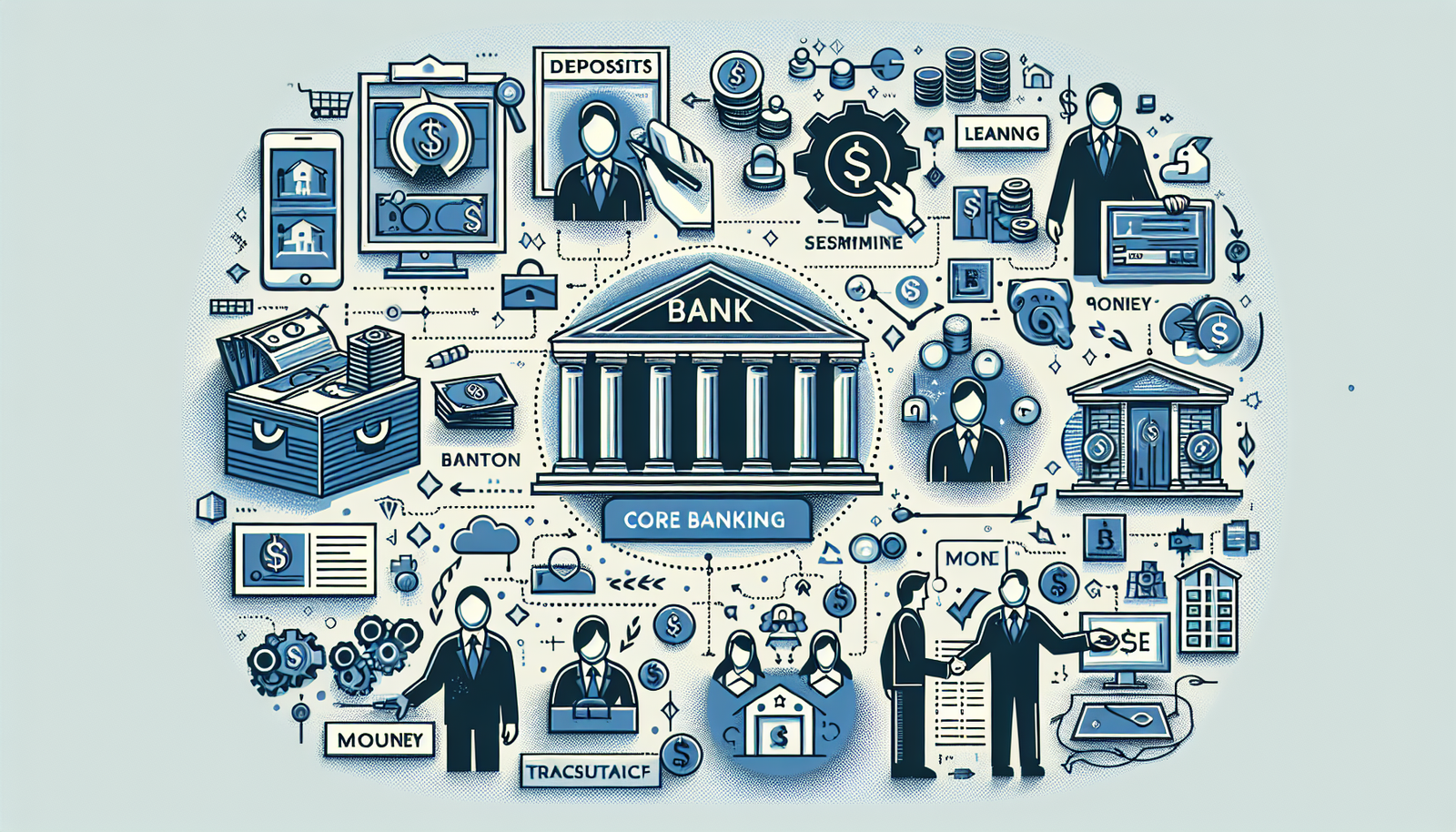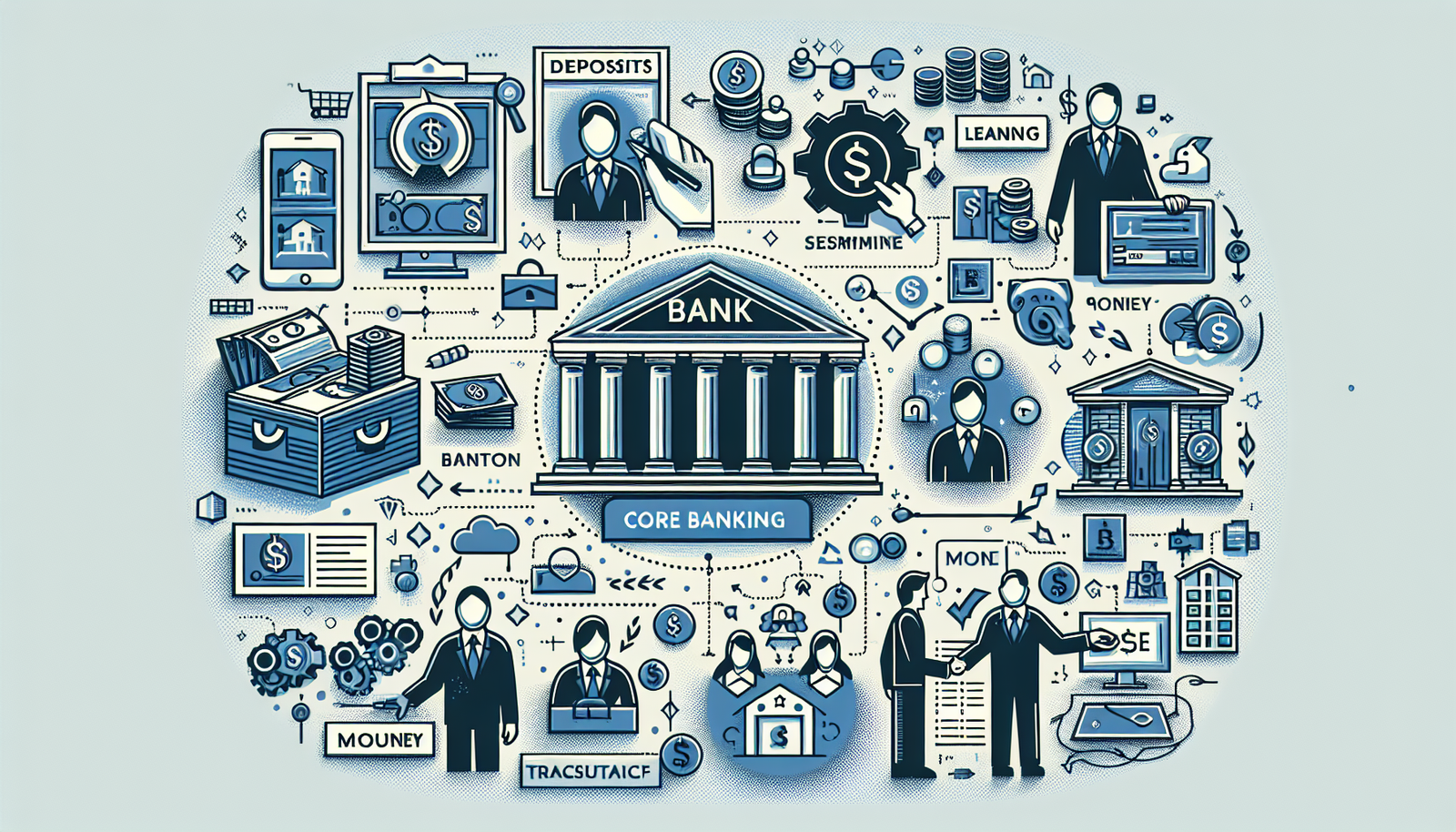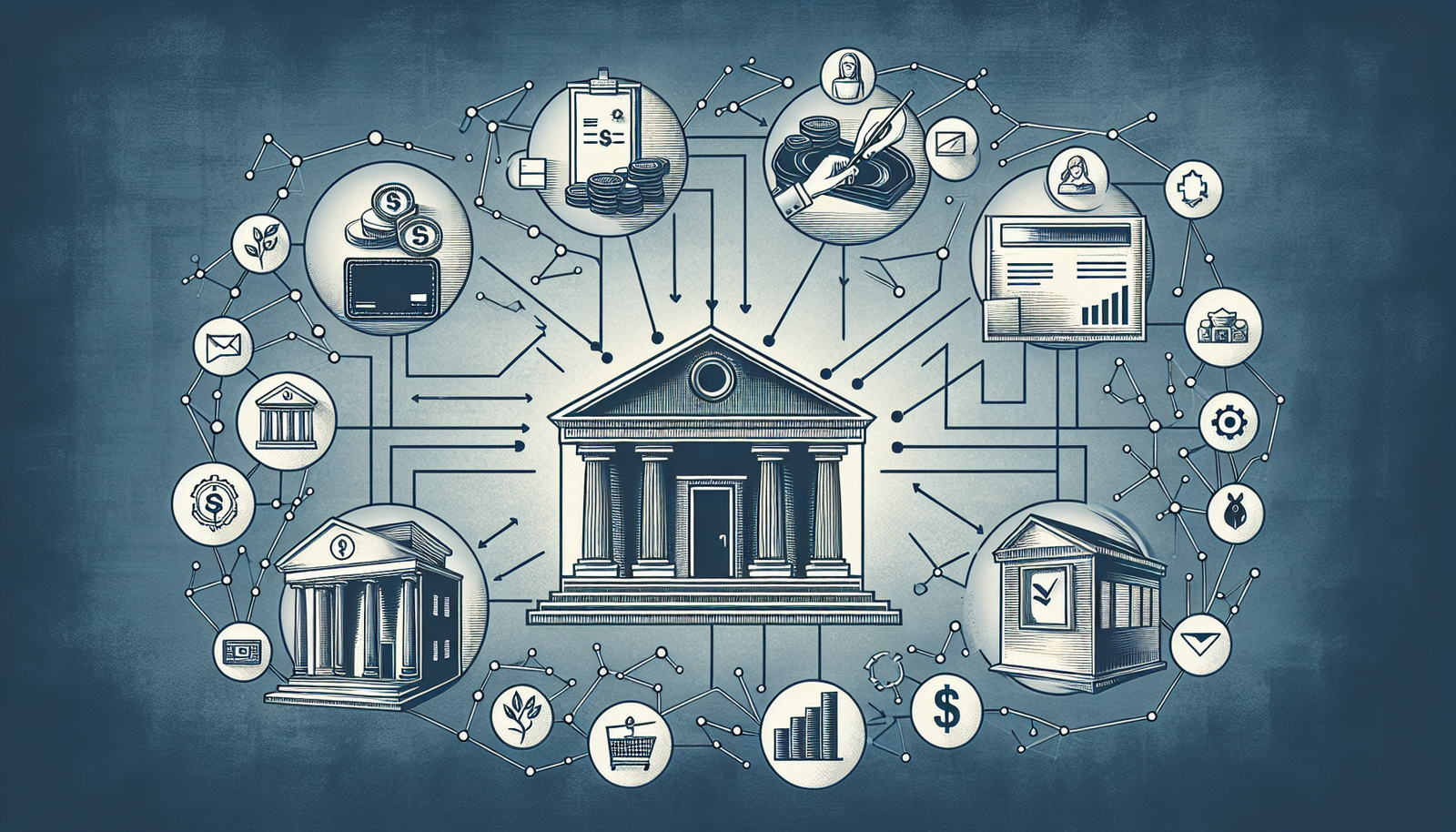
Imagine yourself walking into a bustling bank, layers of conversations and transactions humming around like an orchestral symphony. The air is filled with anticipation – such a simple yet complex institution playing a central role in our daily lives. This article is going to voyage through the intricate corridors of a bank’s operations, guiding you through the myriad functions that quintessentially keep the wheels of the economy turning. Think of the bank as the heart of an economic body, pumping financial lifeblood to all its various components; from maintaining and handling accounts, issue of drafts and checks, to grant loans, investing funds, and crucially serving as an intermediary in the financial system. This article will regard you on an individual basis, helping you grasp the essence of banking operations – because they’re not just for Wall Street elites, they resonate with and impact you at every level of your life.

Primary Functions of Banks
The fascinating journey of your money starts at banks. These financial wizards perform a host of primary functions, carefully maneuvering your cash to facilitate various economic activities.
Accepting Deposits
At the core of a bank’s duties is the function of safekeeping your funds. Yes, when you entrust your hard-earned money to a bank, it becomes a deposit. With varieties like savings, current, fixed, and recurring deposits, you have a cornucopia of options to utilize your funds effectively. Your deposit is like the trust you place in the bank, which it cherishes and protects diligently.
Granting Loans and Advances
Banks have an artistry in acting as financial doctors, prescribing loans and advances to cure your monetary maladies. Be it buying a dream house, funding your business, or financing your Ferrari, banks are always ready with loans and advances at your disposal. With interest charged on these loans, they kickstart a financial symbiosis beneficial for you and the bank.
Electronic Payments and Wire Transfers
In a world interconnected digitally, banks serve as reliable bridges between you and your global monetary transactions. Be it a friend in Florence, a company in Copenhagen, or a relative in Rio, with electronic payments and wire transfers, your money can reach any corner of the globe in a jiffy.
Providing Digital Banking Services
Integral to the digital revolution is the phenomenal convenience of digital banking services. Whether it’s midnight or mid-flight or midway through a hike, with digital banking, your bank is just a click away. The 24/7 banking services enhance access, improve efficiency, and ensure a smooth banking experience.
Secondary Functions of Banks
Beyond their fundamental services, banks also perform a host of secondary functions.
Underwriting of Shares
A financial chameleon, a bank can also morph into an advertiser, underwriting shares of major companies and government enterprises. Like a dedicated PR agency, the bank shoulders the risk and ensures all issued shares are subscribed.
Dealing in Foreign Exchange
As a financial comb that straightens out the knotty affairs of foreign exchange transactions, banks, authorized by a central bank, buy and sell foreign currencies. This function is instrumental in supporting international trade and travel.
Providing Overdraft Facilities
Even in times of rough weather over your fiscal sea, banks extend support by providing overdraft facilities, enabling you to withdraw money over the balance in your account. It tames your cash crisis and keeps your financial ship sailing.
Banks as a Trustee and Executor
Banks are often custodians of your financial assets and can even be entrusted with the responsibility of overseeing your estate or assets after your demise. Acting as a trustee or executor, the bank diligently fulfills your last financial wishes.
Regulatory Functions of a Bank
Banks also wield the scepter of a regulator, implementing various monetary policies and financial regulations.
Administration of Monetary Policy
Banks play a pivotal role in the administration of a country’s monetary policy, determining the reserve ratio, interest rates, and other macroeconomic factors.
Co-regulation of Other Financial Intermediaries
Banks also work in tandem with regulatory authorities to oversee and co-regulate other financial intermediaries, ensuring a fair and transparent financial market.
Implementing Credit Control Measurements
Control in credit, like controlled breathing in yoga, is vital for financial stability, and banks are adept at it. By modulating the interest rates and dictating the terms of borrowing, banks influence the flow of credit in the economy, making it a critical tool in controlling inflation.
Ensuring Financial Stability System
By keeping a vigilant eye on financial markets and banking transactions, banks play a crucial role in preserving the stability of the financial system.
Digital Banking Services
Internet Banking
Stepping into the virtual world, banks offer far-reaching internet banking services. From transfers, transactions, and tracking, everything is at your fingertips. The control and convenience this system provides make it a game-changer in customer service.
Mobile Banking
Complementing internet banking is mobile banking—the finance world in your pocket. It turns your mobile phone into a digital wand, executing transactions with just a tap.
ATM Services
Automatic Teller Machines (ATMs) serve as your banking contact point round the clock. They dispense cash, accept deposits and facilitate numerous other transactions, saving you from the rigmarole of counter transactions.
Debit and Credit Card services
Banks lace you with plastic power — debit & credit cards. These cards transform every cash transaction into a simple swipe or tap, ensuring seamless, secure, and swift monetary dealings.

Role of Banks in Economic Development
Banks serve as the heart of an economy, pumping fiscal blood through its veins, fueling growth and development.
Capital Formation
Capital formation is the lifeblood of any economy, and banks make significant contributions by mobilizing savings and directing them into investment channels.
Monetary Stability
With their control over the flow of money, banks lend monetary stability to an economy, preventing it from excessive inflation or deflation.
Promotion of Entrepreneurship
Banks nurture the seeds of entrepreneurship with timely financial assistance and expert guidance. They are like spring rains that make the dreams of budding entrepreneurs blossom.
Provision of Specialized Services
Banks also cater to diverse sectors by providing specialized banking services, like agricultural banking, industrial banking, retail banking, etc., propelling sector-specific economic growth.
Role of Banks in Rural Development
Like diligent bees, banks are the nectar collectors and distributors of rural areas, facilitating growth with customized banking services.
Farm Credit
Banks provide timely farm credits to farmers, aiding them in their agricultural activities. It fuels the growth of the agricultural sector, which in turn feeds the nation.
Non-farm sector credit
In addition to agriculture, the rural economy thrives on various other sectors. Banks extend credit facilities to these enterprises, accelerating their development.
Micro Credit
Microcredit aims at uplifting the socio-economic status of the economically weaker sections. Small but impactful, it’s a potent weapon in banks’ armory to fight poverty and promote rural wealth.
Rural Housing Loan
Rural housing loans by banks afford rural folk their dream of owning a house, contributing to improved living standards.
Investment Functions of Banks
Like gushing rivers that carve out canyons, banks flow through landscapes of investment, shaping new opportunities and enhanced returns.
Portfolio Management
Helping you diversify your assets, banks manage your portfolio proficiently, maximizing your returns, and minimizing risks.
Capital Market Intermediary
Serving as an interface between investors and the capital market, banks work as intermediaries, contributing to a liquid and vibrant financial market while ensuring secure and hassle-free investments.
Stock Brokerage Services
Banks can provide competent stock-broking solutions, acting as a reliable advisor on your path to wealth creation.
Proprietary Trading
Some banks also engage in proprietary trading, buying and selling financial instruments for their own account. Although fraught with risks, it can result in substantial profits.
Agency Functions of Banks
Banks are the trusted emissaries of the financial world, extending their reach to facilitate various fiscal interactions.
Collecting and Paying Agents
As collecting and paying agents, banks handle large volumes of transactions on behalf of their clients, making them their lifelines in trade and commerce.
Transfer of Money and Securities
When you wish to transfer your money, banks step in as reliable couriers. Even securities like shares and bonds can be transferred smoothly through these financial conduits.
Portfolio Management Services
Beyond drawing and managing your portfolio, banks are also equipped to oversee its performance, guiding and steering it in the right direction.
Providing Trade Finance
With various trade financing solutions, banks lubricate the wheels of global commerce, making international trade smoother and more efficient.
Banks as Financial Intermediaries
Like the indispensable middlemen of the finance realm, banks connect dots, transforming risks into returns and short-terms into long-terms.
Credit Intermediation
By channeling funds from savers to borrowers, banks serve as the heart of credit intermediation, ensuring productive use of idle resources.
Maturity Transformation
In the financial alchemy that banks perform, they transform short-term liabilities into long-term assets, relishing in the sorcery of maturity transformation.
Risk Transformation
Banks skillfully manage the risks associated with lending and investments, spreading your investments thin to mitigate risks. It’s quite enthralling how their risk transformation function turns the tables for you.
Funds Transfer
Banks act as a conduit for funds transfer, moving money between account holders and across banks, maintaining the liquidity and regular operation of monetary transactions.
Impact of Banking on Society
Banks touch lives beyond ledger books and balance sheets. Let’s understand how.
Financial Security
With their safekeeping of funds and reliable financial services, banks bestow you with a sense of financial security, keeping your money safe and your mind at peace.
Job Creation
Banks generate employment, not only directly but also indirectly. From IT to construction, their influence traverses sectors, yielding jobs that nurture thousands of dreams.
Wealth Distribution
By extending financial services to every stratum of society, banks play a pivotal role in wealth distribution. They infuse credits into society’s veins, aiding in circulatory health within the economic ecosystem.
Promoting Economic Growth
As the pulse of the financial sector, banks boost economic growth. From employment generation to entrepreneurial promotion, their contribution embraces every sphere of economic activity.
In essence, banks are much more than just monetary institutions. They adapt, evolve, and mold themselves as per societal needs. From primary services to rural development and from acting as financial intermediaries to impacting society, they play varied roles with aplomb. They are the silent warriors of economic growth and maintainers of financial stability, waiting to serve you at every twist and turn of your financial journey.
Leave a Reply